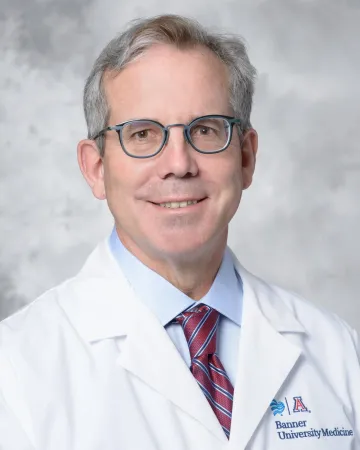
Welcome to the Department of Surgery at the University of Arizona. We’re proud to have a mission of advancing the field of surgery through excellence in patient care, transformative discoveries from basic to translational science, and dynamic training of our residents and fellows. It is an honor to lead such a remarkable group of surgeons striving to transform and improve the care of patients from all backgrounds in all of our surgical specialties.
We currently have seven divisions: abdominal transplantation; cardiothoracic surgery; general surgery; pediatric surgery; surgical oncology; trauma, surgical critical care, burns, and acute care surgery; and vascular and endovascular surgery. Our department also includes sections of plastic and reconstructive surgery; minimally invasive, robotic and bariatric surgery; endocrine surgery; podiatry; and thoracic surgery.
Academic medicine has always advanced medical care and educated the next generation of providers because of our curiosity and passion. We have the privilege of being able to pursue “bedside to bench to bedside” research and care. We can quickly identify the pressing questions impacting our patients and providers, and we have the resources to search for answers to those questions.
Currently, our department has 68 active grants, with funding from the National Institutes of Health, the Department of Defense, and the Juvenile Diabetes Research Foundation, among other national and regional partners. I believe the positive impacts of our research are heightened when we embrace an entrepreneurial mindset: envisioning the possibilities and finding creative, nimble, clever ways to overcome challenges and accomplish our goals.
Here at the University of Arizona, that charge is enhanced by our responsibility as part of a land grant institution to serve our residents throughout the region. We strive to provide innovative, state-the-art care that is also accessible, equitable and compassionate.
One way we do that is through the recruitment and retention of diverse trainees and faculty through strong residency, fellowship and early career mentoring programs. We want to engender a joy and love of learning among our providers to keep those fires of curiosity alive, especially for trainees as they move through the intensive years of residency and fellowship.
Ultimately, we want to create truly caring physicians who are going to be empathic to their patients and also be curious enough to advance the field of surgery in meaningful ways.
Sincerely,
Geoffrey Gurtner, MD, FACS
Chair, Department of Surgery
Professor, Surgery and Biomedical Engineering

